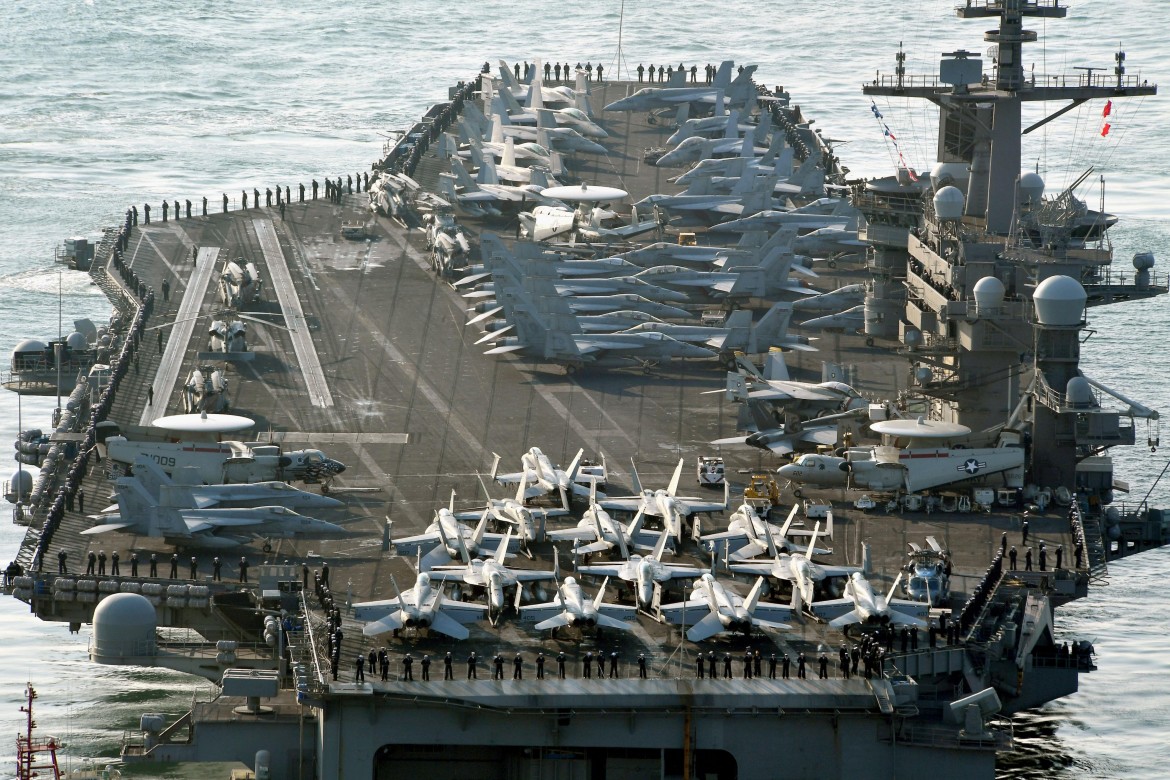Analysis
U.S. aircraft carrier is harbinger of Asia policy
By sending the USS Carl Vinson to the Korean peninsula, Donald Trump mimics the Asia policy of his predecessors. China and Korea react with sanctions agreement for Pyongyang.

After the weekend, the latest developments on the North Korean nuclear threat seem to give a glimpse of a strategic semblance attributable to Washington’s smoky foreign policy.
If initially the sudden decision by Donald Trump to bomb the Syrian base at the same time the Sino-American summit was being held at the Mar-a-Lago resort seemed like yet another “head fake” by the U.S. president, in the light of all the moves and countermoves of the last two days, one tries to find a coherent design, an American plan to unlock the international impasse with North Korea and, consequently, with the Beijing leadership.
After the game restarted on Saturday evening with a move from Pyongyang, the statement issued by the North Korean ministry of Foreign Affairs reaffirming the country’s determination to proceed with the national military nuclear program as a deterrent for a potential foreign interference, on Sunday morning the U.S. Navy ordered the aircraft carrier USS Carl Vinson to head for the Korean peninsula.
The route change of the Vinson, which until then had been docked at the Singapore port waiting to head to Australia, is the latest Washington move in a delicate diplomatic game with China.
At the end of the meeting in Florida, the two powers did not reach a consensus on how to “manage” Kim Jong Un and his missile excesses, and held their positions. On one hand, Beijing is urging the parties to reopen the dialogue and attempt to find a “political solution,” considering Asia a territory where the interference of the stars and stripes is not welcome. On the other hand, Washington is faced with the refusal of Beijing, determined to quickly “act on its own,” recording the progressive urge to “control” Kim and ensure the protection of historical allies in the area, especially Japan and South Korea, which at this time is without a government and without presidency because of a deep internal crisis.
Yet the U.S. decided to increase the unfolding tensions among the four countries by relocating one of the giants of his military fleet; in fact, the U.S. has decided to continue a war of nerves which until now had been completely managed on the media, in an attempt to get the Chinese diplomacy in the corner and force Xi Jinping to take a net position.
This arrived Monday, following a meeting between the chief envoy to the South Korean nuclear issues Kim Hong-kyun and the Chinese Special Representative for affairs in the Korean Peninsula Wu Dawei.
In a statement, Seoul said that “China and South Korea are in agreement to impose new and tougher sanctions if North Korea executes new nuclear or long-range missile tests.” During a press conference, Kim made it clear that said sanctions “will be in accordance with the resolutions of the U.N. Security Council.”
In essence, it seems that Chinese diplomacy has provisionally decided to shift its own weight in line with the Seoul-Washington sanctions axis, with the hope of averting an escalation of the tension that neither Kim nor Trump seems to have plans to mitigate.
In February, China had already announced the blockade of all coal imports from North Korea, according to the U.N. resolution of November 2016. On that occasion, for the first time ever, China had voted in the U.N. Security Council in favor of sanctions against North Korea, a country traditionally economically and diplomatically “protected” by Beijing.
With the closure of the North Korean industrial complex in Kaesong in 2016 — located on the border between the two Koreas and co-managed by Pyongyang and Seoul — China is estimated to absorb 90 percent of the North Korean trade.
In this sense, the threat of new sanctions agreed with Seoul is an indicator of Beijing’s frustration. The country, which shares a border with North Korea, had been forced by this alleged Trump “strategy” — identical, so far, to previous American administrations, from Bush Jr. forward — to act in a very delicate situation: to “punish” Pyongyang but not too much, avoiding the risk of completely destabilizing the North Korean regime, which would create unpredictable and, therefore, uncontrollable geopolitical scenarios.
Originally published at https://ilmanifesto.it/seul-pechino-dice-si-sanzioni-a-pyongyang/ on 2017-04-11
